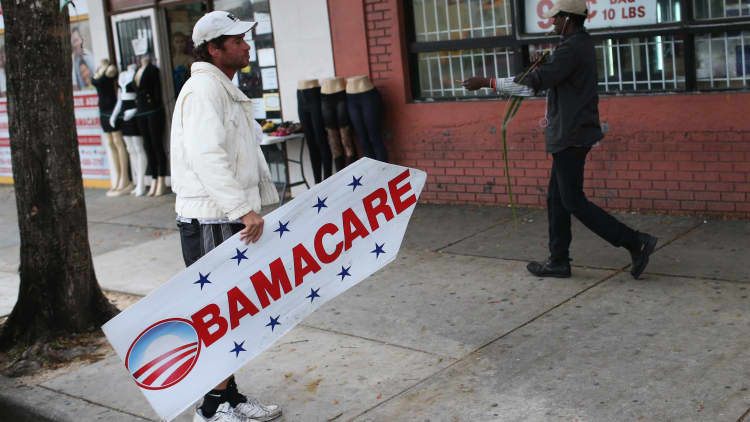Whatever type of program President Trump chooses to replace the Affordable Care Act, one thing won't change: Health care will continue to be one of the worst shopping experiences for most Americans. It's not often thought of like this, but it is a consumer purchase, and among the most frustrating.
"Health care is one of those experiences in which we are always first-time buyers," said David Vivero, co-founder and CEO of health-care start-up Amino.
Lingo like deductible, premium, copay, co-insurance or out-of-network can seem foreign, confusing patients during their most vulnerable moments. Horror stories abound — patients who inexplicably had to pay double for the same pharmaceuticals they had been taking for years, surprise medical bills for many thousands of dollars for what they had been told were in-network.
Vivero learned from personal experience. Because of a genetic condition, he couldn't find health insurance coverage before 2013, when the Affordable Care Act came into effect. Though he says his situation is somewhat unique, in other ways it's very common. "Not everyone has this disease, but almost everyone runs into [issues with] health care sometime during the year," Vivero said.
Patients can't usually call up a friend and ask for a recommendation. But unlike most people, Vivero did something about the frustration. He started Amino, which gives patients access to information like doctors' experience and the cost of a given procedure, to help patients understand exactly what they're paying for before setting foot in a doctor's office.
Amino is not profitable but its business model is to ultimately make money by selling part of its analysis to private companies, for uses such as monitoring networks of physicians.
Amino is just one of the start-ups created to help patients navigate health care at a time when more Americans have coverage than ever before, but at a cost that keeps going up. Amid rising premiums and deductibles, many individuals can't shake the feeling they're paying more for less.
You have to be an active health-care consumer; it's no longer an option.Doug Hirschco-founder and co-CEO of GoodRx
"You have to be an active health-care consumer; it's no longer an option," said Doug Hirsch, co-founder and co-CEO of GoodRx, an online company that allows consumers to compare drug prices from nearby pharmacies. "You're going to pay exorbitant amounts of money that are irrational. Because the system is irrational."
Billing issues are a good example. Before Obamacare, insurers and medical providers would negotiate contested charges without the consumer being involved, said Victor Echevarria, CEO of Remedy, a start-up in which an algorithm helps trained professionals check over medical bills to find errors that can save health-care consumers money (the start-up takes a cut of whatever money it saves a patient). After visiting a health-care provider, many Americans are finding themselves faced with surprising charges for services they never knew were being provided.
More patients are seeking outside support. There's a growing market for specific types of insurance plans designed to cover the first few thousand dollars in health-care costs for high-deductible plans ("insurance for your insurance," as one woman told NPR). The number of patient advocates, an expensive option for patients who aren't getting the right care, is increasing across the country.
Repeal and replace
The consumer woes and need for help won't lessen if the ACA is repealed, as Republicans have promised to do under Trump. The Congressional Budget Office estimates that 18 million Americans would lose their health insurance in the first year of an ACA repeal that matches a 2015 congressional plan, and up to 32 million by 2026.
In any event, consumers will likely have to bear even more of the burden under Trump, said Steve Kraus, a partner at Bessemer Venture Partners, a venture capital firm that invests in health-care start-ups. That could be good news for start-ups marketing directly to consumers, but maybe not as much for the consumers who have to go through the health-care shopping experience.
More from Modern Medicine:
9 new tech gadgets for fitness buffs
Threats at abortion clinics rise since Trump's election, advocates 'facing fight of their lives'
Allergy sufferers take note: A pill may soon replace the costly EpiPen
"If billions of health-care searches on Google tell us anything, it's that consumers are already searching for such information," Vivero said.There are resources out there — insurance portals, employer intranets, state websites — that can tell consumers how much procedures might cost them, but they aren't being used, Vivero said. Amino's goal is to change that.
Amino has raised at least $26 million in four rounds of funding, according to CrunchBase. Remedy and GoodRx have raised $1.9 million and $1.5 million, respectively. But none of the companies would share revenue or user traffic figures. Their CEOs say they are seeing the impact in terms of the number of searches and visitors on their sites, but would not provide any specifics.
Health start-ups plan to expand, but Kraus warned against doing so too quickly. Direct-to-consumer business models are less reliable than B2B models, so there's even greater risk of trying to grow a company too fast to be sustainable. "Health care doesn't hyperscale," Kraus said. "New companies often require a decade to truly become established."

The number of VC deals for health-care companies doubled between 2010 and 2014. Investors poured $20 billion into health-care start-ups in 2015, according to research firm PitchBook. But in 2016 investment slowed, down more than $3 billion, though the total number of deals increased, according to Bill Evans, the managing director at Rock Health, a venture capital firm focused on digital health.
Kraus called the influx of investment a "gold rush" but said those days may be coming to a close as the industry grows up.
Impending changes in the health-care system under Trump have also probably slowed investment, and Kraus said he wouldn't be surprised if investment in 2017 is even lower than last year. "Health care is an industry where public policy really matters. Things slowed down a lot in Q4 [of 2016] because a lot of people were taking a breath to figure out what is the new normal in terms of policy. Change creates uncertainty, and uncertainty creates inertia."
Kraus suspects that lawmakers won't repeal the ACA without replacing it, because the move is so unpopular among voters, but there's no guarantee the system that replaces it will work. And few substantial changes will go into effect until 2018 or perhaps even later.
"Regulatory uncertainty is worse for innovation than outright change," Evans said. "I'm far less concerned about the replacement of the ACA when it comes to start-ups than I am about the introduction of uncertainty during a potentially long process."
— By Alexandra Ossola, special to CNBC.com




